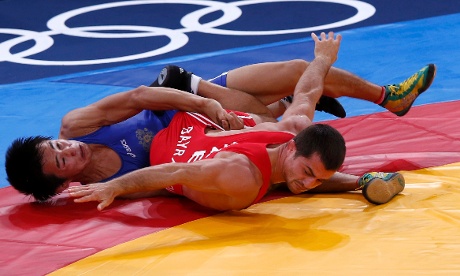Astonishing as it may seem to some of us・・・
2013年2月14日
An end to Olympic wrestling would be a brutal break with the ancient Games
Wrestling was a blue riband event of the ancient Olympics – even Plato got involved. Let's keep this connection going
Paul Cartledge
guardian.co.uk, Wednesday 13 February 2013 13.44 GMT

Azerbaijan's Rovshan Bayramov (in red) fights with Russia's Mingiyan Semenov in the men's 55Kg Greco-Roman wrestling qualification at London 2012. Photograph: Kim Kyung-Hoon/Reuters
Astonishing as it may seem to some of us, the International Olympic Committee is proposing to drop wrestling from the 2020 Games onwards. The sport – which has been included in every Games but one since the modern Olympics were reintroduced in 1896 – will be relegated from the agreed "core" of 25 sports and must compete against another half-dozen "candidate" sports for a place. So where does this leave the relationship between the modern Olympics and their supposed ancient model and inspiration?
Of course, the 1896 Olympics, despite Pierre de Coubertin's masquerade of pure revivalism, were actually a reinvention of the ancient Games. There was, to take just one instance, no "marathon" race held in antiquity, where the explicitly styled "long" race at Olympia was a mere 24 up-and-back laps of a 200-metre stadium (some 5,000m in all, "middle distance" to us). But the inclusion of wrestling in the 1896 programme does represent a genuine case of continuity, even if modern modes and regulations inevitably differed.
In ancient Greece, wrestling was not just a game for cads and thugs. It attracted the ancient elite, including the most cerebral, such as the philosopher Plato no less. (It's even possible that "Plato", derived from the Greek adjective meaning "broad", was not his given name but a wrestler's nickname.)
Exponents who won at one of the so-called Crown Games (so named because the prize was just a crown – made of sacred wild olive leaves at Olympia, for example) might even receive a celebratory lyric ode composed in the highest literary style and the most excruciatingly complex Greek by a master such as "silver-tongued" Pindar. Wrestling metaphors – especially the "third fall" image, because to win you had to force your opponent's shoulders to touch the sand three separate times – turn up in the high-flown poetry of classical Greek tragic drama.
Among the "heavy" or combat events on the ancient Olympic programme, wrestling stood out in prestige and prominence in the same way as the stade race (the roughly 200-metre sprint) stood out among the running events. In fact, at the first of several Olympic meets way back in the 8th century BC there was just the one event – the stade race. And so prestigious was that foundational event that long afterwards a particular celebration of the Games would be known as the Games of (say) Orsippus – as if we might today refer to London 2012 as "Usain Bolt's Games".
But as soon as wrestling was added to the programme in 708 BC – both as a stand-alone event and as a component of the new, five-event pentathlon – its fans quickly challenged the track enthusiasts. They pointed to the fact that one claimant to be the true founder of the Games, the half-man, half-god hero Heracles (Hercules), was a famed wrestler.
Probably the most famous of all real-life ancient Greek wrestlers, the Steve Redgrave of ancient Olympians, was Milo (in Greek Milon) of Croton (modern Crotone in Calabria). He flourished in the decades around 500 BC, starting out by winning in boys' competitions, then going on to 32 victories in men's events throughout the Greek world, including no fewer than six Olympic crowns.
Milo(n) would surely be revolving in his grave now if he had heard the IOC announcement. Should we share his grief and horror? That depends in part on one's canon of aesthetics or perhaps even ethics. The past is a foreign country, and they did things differently there. But certainly I, as a historian of ancient Greek culture, would be sorry to see this particular link between ancient and modern, between them and us, so brutally snapped. In particular, those of us who believe the modern Games should be returned permanently to their original homeland (and stripped thereby of some of the grosser excrescences of contemporary commercialisation) would want to keep wrestling firmly at their core.

